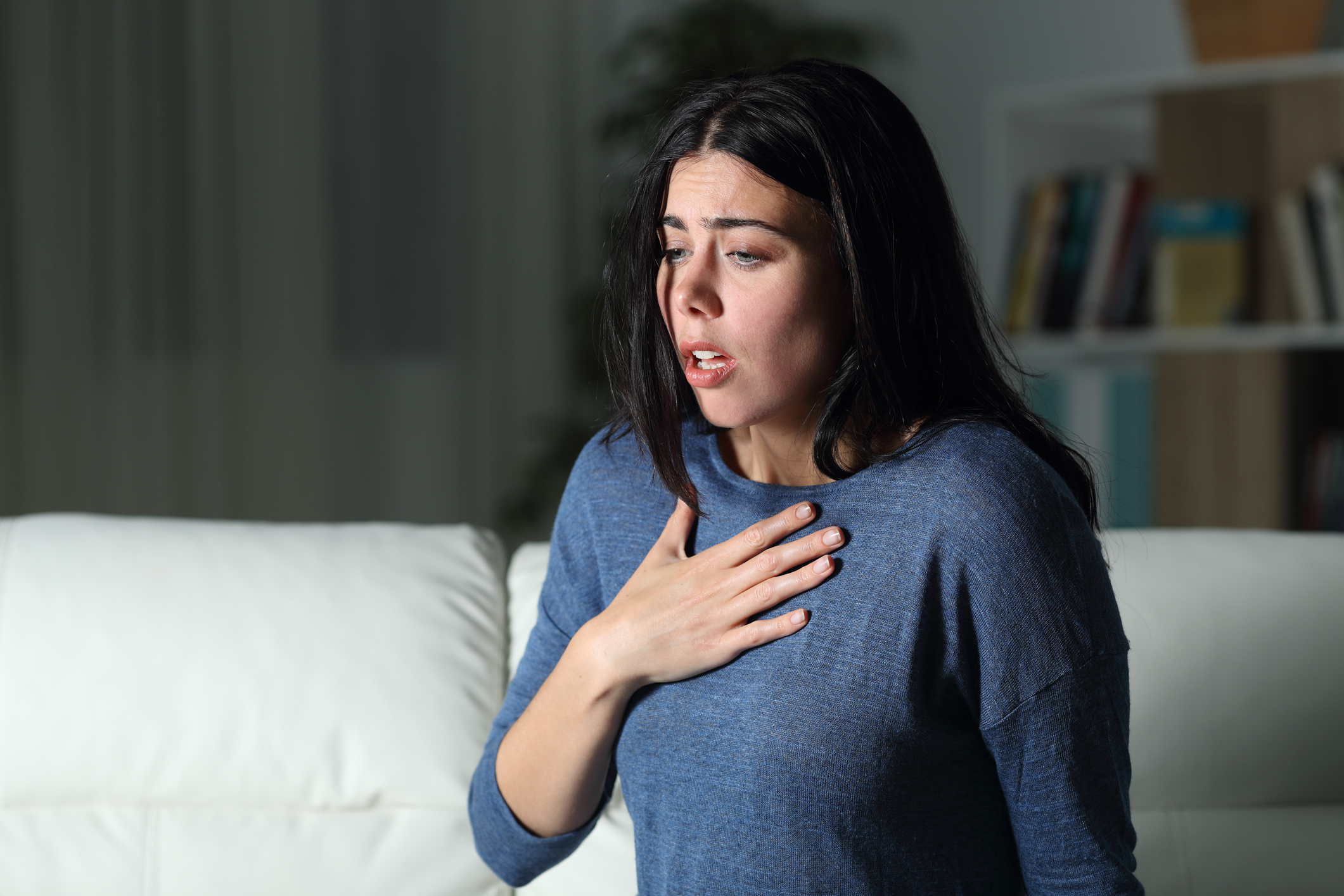Sleep apnea
August 4, 2025
Why Do I Wake Up Gasping or Choking at Night?
Waking up gasping or choking at night usually means your breathing has been interrupted during sleep. Most of the time, it's a sign that your airway has narrowed or closed off, cutting off oxygen and forcing your brain to jolt you awake.
That sudden gasp is your body fighting to breathe again, often with a pounding heart, confusion, and a strong feeling of panic. These episodes don’t happen for no reason, and they’re often linked to underlying medical conditions that need attention.
What’s Actually Happening When You Wake Up Gasping?
This gasp is a survival reflex. During sleep, your breathing should remain smooth and automatic. But when airflow is blocked or irregular, carbon dioxide builds up in your bloodstream while oxygen drops. In response, the brain triggers a sympathetic surge, a jolt to wake you up and restart breathing. Gasping, choking, coughing, or suddenly sitting up in a panic often follows as your body scrambles to restore airflow.
Episodes like this typically occur in deeper sleep stages when muscle tone is lower. The upper airway becomes more prone to collapsing or narrowing, especially if you're sleeping on your back, have excess soft tissue in the neck, or anatomical issues like a recessed jaw or enlarged tonsils.
The body sees this oxygen deprivation as a life-or-death issue. It’s not just a bad dream. It’s a physiological alarm bell.
The Most Common Cause: Obstructive Sleep Apnea
The most common reason people wake up gasping at night is a condition called obstructive sleep apnea. It affects around 22 million Americans, but most don’t even know they have it. About 80% of moderate to severe cases go undiagnosed (1).
What happens during sleep apnea is simple but serious: the muscles in your throat relax too much while you sleep. This causes the soft tissues in your airway to collapse and block the flow of air. Breathing can stop for 10 to 30 seconds at a time. And this can happen hundreds of times each night.
Each time your brain senses that you’re not getting enough air, it quickly forces you to wake up so you can breathe again. That’s why people often gasp, choke, or snore loudly in the middle of the night. Most don’t even realize it’s happening, but it breaks up their sleep and prevents their body from getting the deep rest it needs.
Symptoms of OSA include:
- Loud, habitual snoring
- Witnessed apneas (breathing pauses during sleep)
- Morning headaches
- Dry mouth or sore throat
- Excessive daytime sleepiness
- Poor memory or concentration
OSA is strongly linked to other health conditions like high blood pressure, type 2 diabetes, heart disease, and stroke. Left untreated, it increases mortality risk and reduces quality of life. It’s more common in men, people over 40, and those with obesity. But it can affect anyone, including children.
Other Possible Medical Causes of Gasping or Choking at Night
Although OSA is the most common cause, it’s not the only one.
- Central Sleep Apnea (CSA): Unlike OSA, CSA isn’t caused by airway blockage. Instead, the brain fails to send proper signals to the breathing muscles. It’s less common and often linked to heart failure, stroke, or opioid use. Gasping in CSA can also be dramatic, but the underlying cause is neurological.
- GERD (Acid Reflux): When stomach acid flows back into the esophagus during sleep, it can reach the throat and cause a spasm of the vocal cords (laryngospasm). This can cause a terrifying choking sensation, hoarseness, or a sour taste in the mouth. People with GERD often experience symptoms worse when lying flat or after late-night meals.
- Nocturnal Seizures: Some forms of epilepsy may present as sudden nighttime awakenings with gasping or choking. These are rarer but should be ruled out if other neurological symptoms are present.
- Heart Conditions: Congestive heart failure and arrhythmias can cause periodic breathing changes at night, including Cheyne-Stokes respiration, where breathing rhythm becomes abnormal and gasping can occur. This often overlaps with CSA.
- Postnasal Drip or Allergies: Mucus accumulation in the back of the throat, especially when lying down, can lead to coughing, gagging, or short choking episodes, though these are usually milder and not associated with significant oxygen drops.
It Could be Night Terrors or Panic Attacks
Nocturnal panic attacks can mimic the symptoms of sleep-disordered breathing: waking suddenly, heart racing, struggling to breathe, feeling like you're suffocating or dying. But unlike apnea, there's no airway obstruction, just overwhelming anxiety. These attacks are typically brief (under 10 minutes) but emotionally intense.
Night terrors, more common in children but also found in some adults, occur during non-REM sleep. The person may scream, flail, or gasp, but often doesn’t fully awaken or remember the episode. Night terrors are usually caused by stress, sleep deprivation, or trauma.
Panic-related gasping is real, and terrifying, but it’s not driven by oxygen deprivation. Still, it deserves treatment, especially if episodes are frequent or impair your sleep.
Warning Signs It’s Serious
Waking up gasping isn’t always dangerous, but it can be a sign of a serious health problem. Some symptoms mean your body isn’t getting enough oxygen during sleep.
Knowing these warning signs early can help you get the right diagnosis and avoid bigger health risks:
- Loud, frequent snoring, especially if it’s followed by silence and then gasping
- Witnessed breathing pauses during sleep (a partner may notice)
- Daytime exhaustion, even after “enough” hours in be
- Morning headaches, which often result from oxygen deprivation overnight
- Waking up confused, disoriented, or short of breath multiple times a night
- High blood pressure that’s resistant to medication
- Memory issues, brain fog, or poor concentration
- Mood changes like irritability, anxiety, or depression
In severe sleep apnea, your oxygen can drop below 90% over and over during the night. That’s a problem. Your oxygen should stay above 95% while you sleep. When it falls too low, it puts a lot of strain on your heart and brain.
If you ever wake up gasping along with chest pain or a sudden sense that something is very wrong, it could be a heart-related emergency. Call for medical help right away.
Even if the gasping only happens sometimes, or the symptoms come and go, it’s still important to get checked by a doctor.
Sleep Study Can Help You Get Answers
A sleep study is the only way to know for sure what’s happening during the night. Gasping can be caused by different things, and guessing isn’t enough. Objective data matters.
There are two main types:
- Polysomnography (in-lab sleep study): Conducted overnight in a sleep center. Tracks brain waves, oxygen levels, breathing effort, airflow, heart rhythm, and body movement.
- Home sleep apnea test (HSAT): Done in your own bed. Simpler and more convenient, but primarily used to detect obstructive sleep apnea.
What a sleep study can reveal:
- Number and type of apneas and hypopneas (full or partial breathing pauses)
- How low your oxygen levels drop during sleep
- Whether your gasping is linked to position, REM sleep, or certain events
- If your breathing pattern suggests central sleep apnea or Cheyne-Stokes respiration
- Whether arousals from sleep are due to physical obstruction, limb movements, or other causes
- Sleep architecture—how much deep sleep, REM sleep, and light sleep you get
- Heart rate and rhythm throughout the night
- Body movements and leg jerks during sleep
- Snoring intensity and frequency
- Sleep latency and arousal index
For people who wake up gasping and don’t know why, this test is essential. No other method can pinpoint breathing disruptions with this level of detail.
Early diagnosis leads to better outcomes. Sleep apnea, for instance, increases the risk of stroke by 60% and heart failure by 140% if left untreated (2). A simple overnight test can change the trajectory of your health.

Treatments Available for Gasping and Choking During Sleep
Treatment depends on the cause, but the good news is, most cases are manageable.
If it’s obstructive sleep apnea:
- CPAP (Continuous Positive Airway Pressure): The gold standard. Keeps airways open by delivering steady airflow via a mask.
- Inspire (Hypoglossal Nerve Stimulation): An FDA-approved implant that activates the tongue muscle to prevent airway collapse during sleep. It’s the second most effective option for moderate to severe OSA, particularly for those who can’t tolerate CPAP.
- Oral appliances: Custom-fitted devices that reposition the jaw and tongue. Less effective than CPAP but often preferred for comfort and portability.
- Positional therapy: Sleeping on your side instead of your back can reduce symptoms in mild cases.
- Weight loss: A 10% weight reduction can improve OSA severity by up to 30%. Bariatric surgery has resolved OSA in up to 85% of patients who lost significant weight.
- Surgical options: For select patients, like those with deviated septums or enlarged tonsils, ENT surgeries may help.
If it’s acid reflux:
- Raise the head of the bed 6–8 inches
- Avoid late meals and acidic foods
- Consider medications like PPIs under a doctor’s supervision
If it’s panic-related:
- Cognitive Behavioral Therapy (CBT), especially CBT for insomnia (CBT-I), can reduce nocturnal panic
- Medication may be appropriate for some, but therapy is first-line
- Stress reduction, better sleep hygiene, and limiting stimulants also help
Let Us Help You Sleep Safely Again
Waking up gasping is a red flag. You don’t have to face it alone. Nightly has helped thousands of people uncover the real cause behind their disrupted sleep.
If your nights bring fear, breathlessness, or confusion, there’s a reason. Our medically designed online sleep check takes only minutes and guides you toward what comes next. That could mean testing, treatment options, or simply knowing what’s happening.
Your body is sending signals. We’ll help you understand them. Start your free sleep assessment now and get back to peaceful nights.
References
- Lee, W., Swamy Nagubadi, Kryger, M. H., & Babak Mokhlesi. (2008). Epidemiology of obstructive sleep apnea: a population-based perspective. Expert Review of Respiratory Medicine, 2(3), 349–364. https://doi.org/10.1586/17476348.2.3.349
- Girardin Jean-Louis, Zizi, F., Clark, L. T., Brown, C. D., & McFarlane, S. I. (2008). Obstructive Sleep Apnea and Cardiovascular Disease: Role of the Metabolic Syndrome and Its Components. Journal of Clinical Sleep Medicine : JCSM : Official Publication of the American Academy of Sleep Medicine, 4(3), 261. https://pmc.ncbi.nlm.nih.gov/articles/PMC2546461/

